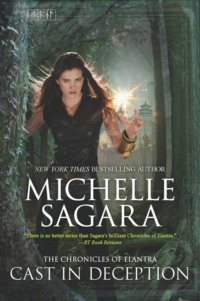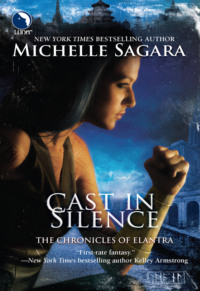
Полная версия
Cast In Secret


Praise for
MICHELLE
SAGARA
and The Chronicles of Elantra series
Cast in Shadow
“No one provides an emotional payoff like Michelle Sagara.
Combine that with a fast-paced police procedural, deadly
magics, five very different races and a wickedly dry sense of
humor—well, it doesn’t get any better than this.”
—Bestselling author Tanya Huff
“Intense, fast-paced, intriguing, compelling
and hard to put down … unforgettable.”
—In the Library Reviews
Cast in Courtlight “Readers will embrace this compelling, strong-willed heroine with her often sarcastic voice.” —Publishers Weekly
“A fast-paced novel, packed with action and adventure …
integrating the conventions of police procedurals
with more fantastic elements.”
—Romantic Times BOOKreviews
Cast in Secret “The impressively detailed setting and the book’s spirited heroine are sure to charm romance readers as well as fantasy fans who like some mystery with their magic.” —Publishers Weekly
“Remarkable …. Filled with time-release plot threads and
intricate details, these books are both mesmerizing
and unforgettable. If you’re a fan of rich fantasy,
this is the series for you!”
—Romantic Times BOOKreviews, Top Pick (4½ stars)
About the Author
MICHELLE SAGARA has written fourteen novels since 1991, when her fi rst book,Into the Dark Lands, was published. She’s written a quarterly book review column for the venerable Magazine of Fantasy and Science Fiction for a number of years, as well as dozens of short stories (or novellas, to be more exact).
In 1986 she started working in an SF specialty bookstore, where she continues to work to this day. She loves reading, is allergic to cats (very, which means they crawl all over her), is happily married, has two lovely children, and has spent all of her life in her native Toronto—none of it on Bay Street
She started reading fantasy almost as soon as she could read, and fell instantly in love with Narnia; her next fantasy discovery was Patricia McKillip’s Forgotten Beasts of Eld. She moved on to The Hobbit, which led to her discovery of the life-changingThe Lord of the Rings.
Her greatest hope for her writing is that someone will read it and be moved by the same sense of magic and mystery that she fi nds in the books she loves.
She will talk about writing, bookselling and books forever if given a chance. You’ve been warned.
Cast in
Secret
Michelle
Sagara

www.millsandboon.co.uk
AUTHOR NOTE
I always wonder at people who tell other people to get a life, because, for all accounts and purposes, I have one. It’s a good life, but there are times when it’s overwhelming, and at times like that I seek a little bit of escape, and a little bit of something that’s larger. I find it in different places—I adored Buffy, especially the first two seasons, adored beyond reason Firefly, read novels, manga and play video games.
I do all these things because they entertain me, and when I decided to write THE CHRONICLES OF ELANTRA books, I wanted to return some of that entertainment, to capture some of its essence. It was a bit of a departure for me—the stories are structured a little bit more like the beloved television shows mentioned above; each volume has some hint of a larger arc, but should be self-contained in the events. I went for a modern sensibility, because the world itself is strange enough. I wanted to be able to make other people laugh, or to move them, because that’s what I want when I seek escape.
Cast in Shadow introduced Kaylin Neya, a young officer of the Law who’s still trying to sort out who she is and where she fits in. Cast in Courtlight threw her headfirst into politics, which is not one of her strengths. In Cast in Secret, I wanted to reintroduce the Tha’alani—the City’s native telepaths. They keep to themselves as much as possible because most of the citizens of Elantra fear and shun them—after all, how many of us want to be surrounded by people who can, at will, examine all our petty or ugly truths?
Kaylin certainly doesn’t. But in Cast in Secret, she has no choice, and I hope the consequences of that lack of choice give back some of what I’ve found in books, manga, anime and movies through the years.
In October, don’t forget to look for Cast in Fury, which deals with the aftermath of this story—and more about the Tha’alani!
This one is for my kids—and peers—
in Makaveli, on Shadowsong
/bonk
/hug
/love
ACKNOWLEDGMENTS
My long-suffering husband, Thomas,
kept home, household and the peculiar space
authors often need safe, as always, but also
found time to read the work in progress, even
when the progress was agonizingly slow. My
parents, Ken and Tami; my children, Daniel
and Ross; John and Kristen Chew and their
children, Jamie and Liam, kept my house
lively. Terry Pearson read this in all stages,
and offered the usual commentary, and the
incentive to keep going.
Mary-Theresa Hussey proved saintly in her
patience, and invaluable in the way editors are
when the author is still too much in the book to see it as a book. (And Adam Wilson sent helpful and cheerful reminders, which were, as it turns out, entirely necessary.)
CHAPTER
1
Private Kaylin Neya studied the duty roster, and given how little she studied anything that wasn’t somehow involved with a corpse, this said something.
The official roster was like a dartboard, except that people threw pencils at it instead. Sometimes they hit a bull’s-eye anyway. Lined up in columns by day, and color-coded for the more moronic—or hungover—by district, it told the various members of the branch of law enforcement known as the Hawks where, exactly, they were meant to either find trouble or stay out of it. Kaylin could easily make out her name, although some clod with lousy aim had managed to make a giant hole in it.
If it was true that the roster could never make everyone happy, it was somehow also true that it could make everyone unhappy. Sergeant Marcus Kassan, in charge of assigning duties on a monthly basis, had a strong sense of fairness; if someone was going to suffer, everyone might as well keep them company.
As the Hawks’ only Leontine officer—in fact, the only Leontine to be an officer of the Halls of Law—he presided over the men and women under his command with a hooded set of fangs in a face that was fur, large eyes and peaked ears—in that order. He also boasted a set of claws that made daggers superfluous and did a good job against swords, as well.
Kaylin had no pencil with which to puncture the paper, or she’d have thrown more at it than liberal curses.
Swearing at one’s assignment wasn’t unusual in the office; as far as office pastimes went, it was one that most of the Hawks indulged in. Kaylin’s partner, Corporal Severn Handred, looked easily over her shoulder, but waited until she turned to raise a dark brow in her general direction. That brow was bisected by a slender, white line, a scar that didn’t so much mar his face as hint at secret histories.
Secret, at least, to Kaylin; she hadn’t seen him take that one.
“What will you be missing?” he asked, when her impressive spate of cursing—in four official languages—had died down enough that he could be heard without shouting. Severn rarely raised his voice.
“Game,” she said curtly. “Ball,” she added.
“Playing?”
She grimaced. “Betting.” Which, for Kaylin, was synonymous with watching.
“Figures. Who were you betting on?”
She shrugged. “Sharks.”
“So you’ll save some money.”
This caused an entirely different spate of swearing, and she punctuated this by punching his shoulder, which he thoughtfully turned in her direction. “You’d be betting on the Tigers, I suppose?”
“Already have,” he replied. “Our shift?” He glanced at the window. It told the time. Literally. Mages had been allowed to go mad when they’d been asked to encourage punctuality, and it showed. The urge to tell the window to shut the hell up came and went several times a day.
The fact that mages had been allowed to perform the spell or series of spells seemed almost a direct criticism of Kaylin, who wasn’t exactly punctual on the best of days.
“Private Neya and Corporal Handred, report to the Quartermaster before active duty.” Some sweet young voice had been used to capture the words. Kaylin seriously wanted to meet the person behind it. And was pretty sure the person behind it seriously didn’t want to meet her.
“Quartermaster?” Severn said, with the barest hint of a sympathetic grimace.
Kaylin said, “Can I break the window first?”
“Won’t help. He’s probably responsible for having the glass replaced, and you’re in enough trouble with him as is.”
It was true. She had barely managed to crawl up the ladder from thing-scraped-off-the-bottom-of-a-shoe-after-a-dog-fight in the unspoken ranks the Quartermaster gave the Hawks; she was now merely in the person-I-can’t-see category, which was a distinct improvement, although it usually meant she was the last to get kitted out. The Quartermaster was officious enough, however, to make last and late two entirely different domains—if only, in Kaylin’s case, by seconds.
“It was just a stupid dress,” she muttered. “One dress, and I’m in the doghouse.”
“I doubt it. You know how much he loves those dogs.”
“Yeah. A lot more than he likes the rest of us.”
“It was an expensive dress, Kaylin.”
“I didn’t choose it!”
“No. But you did give it back with a few bloodstains, a dozen knife tears, and about a pound less fabric.”
“It’s not like it could have been used by anyone else—”
“Not in that condition, no. And,” he added, lifting a hand, “I’m not the Quartermaster, I didn’t have to haggle with the Seamstresses Guild, and I don’t really care.”
“Yeah, but his life doesn’t depend on me, so he doesn’t have to listen to me whine.”
Severn chuckled. “No. Your career depends on him, however. Good job, Kaylin.”
They walked down the long hall that led to Marcus’s desk, which just happened to be situated so that it crossed almost any indoor path a Hawk could take in the line of duty. He liked to keep an eye on things. Or a claw across the throat, as the Leontine saying went.
As the Hawks’ sergeant, assignments came from him, and reports—which involved the paperwork he so hated—went to him. Caitlin, his assistant, and for all purposes, his second in command, was the one who would actually read the submissions, and she wisely chose to pass on only those that she felt were important. The rest, she fudged.
And since the Festival season was, as of two days past, officially over, most of those reports involved a lot of cleanup, a lot of official fines—which helped the coffers of the Halls of Law immensely—and a lot of petty bickering, which would be referred to the unofficial courts in the various racial enclaves for mediation.
Ceding that bickering to the racial courts, rather than the Imperial Courts, took more paperwork. But the Emperor was short on time and very, very short on patience, so only cases of real import—or those that involved the Elantran nobility—ever went to him directly. Given that he was Immortal, being a dragon and all, this struck Kaylin as unfair. After all, he had forever.
“Lord Kaylin,” Marcus said, as they approached his desk. The title, granted her by the Lord of the Barrani High Court, caused a round of snickers and an unfortunate echo in the office that set Kaylin’s teeth on edge. The deep sarcasm that only a Leontine throat could produce didn’t help much. “So good of you to join us.”
She snapped him a salute—which, given his rank didn’t demand it, was only meant to annoy—and stood at attention in front of his desk. Severn’s short sigh, she ignored; he offered Marcus neither of these gestures.
“There’s been a slight change in your beat today.”
The official roster changed at the blink of an eye. A Leontine eye, with its golden iris. “You’re to go to Elani Street,” he told them.
“What, mage central?”
“Or Charlatan central, if you prefer,” Marcus snapped back. Elani Street was both. There was the real stuff, if you weren’t naive and you knew what to look for, and then there was love potion number nine, and tell your fortune, and meet the right mate, all of which booths—usually with much finer names—saw a steady stream of traffic, day in and day out.
Kaylin was always torn between contempt for the people who had such blind dreams and contempt for the people who could exploit them so callously. Elani Street was not her favorite street, mostly because she couldn’t decide which of the two she wanted to strangle more.
She flipped an invisible coin. It landed, after a moment in the mental ether, on the side of people who made money, rather than people who lost it.
“Who’s fleecing people this time?” Kaylin muttered. “It’s only two days past Festival—you’d think people would be tired enough to give it a rest. Or,” she added darkly, “in jail.”
“Many are both,” Marcus replied, and something in his tone made her give up her sullen and almost perfect stance to lean slightly into the desk. Slightly was safe; he still hadn’t cleared half the paperwork the Festival produced annually, and knocking any of the less than meticulous piles over was—well, the furrows in the desk didn’t get there by magic.
“What’s happened?”
“There’s been a disturbance,” he replied. “I believe you know the shop. Evanton’s. You may have given him some business over the years.”
She knew the shop; she had had her knives enchanted there so that they left their sheaths without a sound. Teela had been the Hawk who had both introduced her to Evanton and also made clear to Evanton that anything he offered for money had better damn well work. Given that Teela was one of a dozen or so Barrani—also all Hawks—who had made their pledge of allegiance to the Imperial Halls of Law, her word tended to carry weight. After all, she was, like the dragon Emperor and the rest of her kind, immortal—and the Barrani loved nothing better than a grudge, at least judging by the way they held on to the damn things so tightly. Startlingly beautiful to the eye, they were cold as crackling ice to the ear, and their tall, slender bodies radiated that I-can-kill-you-before-you-can-blink confidence that was, in fact, no act.
Evanton, to his credit, had been neither offended nor frightened. In fact, his first words had been, “Yes, yes, I know the drill, Officer.” And his second: “You’re on the young side for a Hawk. So take my advice, for what it’s worth. You should pay more attention to the company you keep. People will judge you by it, mark my words.”
He generally had a lot of words he wanted marked.
Which had caused Teela to grimace. And Tain, her beat partner, to laugh.
As for the enchantment, he’d approved of it. “Most people who come here want something to make them look prettier,” he’d said, with obvious contempt. “Or younger. Or smarter. This, this is practical.”
She had never asked Evanton if he had ever belonged to the Imperial Order of Mages; there wasn’t much point. If he had, he’d managed to get out the unusual way—he wasn’t in a coffin. Although to Kaylin’s youthful eye, he looked as if he should have been. His hair was the color of blinding light off still water, and his skin was like wrinkled leather; he was almost skeletal, and his work—or so he said—demanded so much attention he was continuously bent over in a stoop. She had been certain, the first time she saw him, that he would break if she forced him to straighten up.
But still … she liked him. So she frowned. “What kind of a disturbance?”
“That, I think, is what you’re there to ascertain.” He paused. “Are you waiting for something?”
“No, sir.”
“Good. Get lost.”
“Yes, sir.”
“Corporal?”
Severn nodded.
“Make sure that she understands that ‘get lost’ in this case isn’t literal.”
“Yes, sir.”
“What I want to know,” Private Kaylin Neya said, not quite stomping her feet as she marched down the streets, “is why no one calls you Lord Severn.”
The corporal—which rank still annoyed Kaylin, and yes, she knew it was petty—shrugged. “Because it doesn’t bother me,” he replied.
“It didn’t bother me when the Barrani called me Lord Kaylin,” she said sourly.
He laughed. He kept an easy pace with her march, given the difference in the length of their strides, and her mood—which could charitably be described as not very good—seemed to cheer him immensely.
“What’s so funny?”
“It bothered you enough to cause you to point out that no one called Teela Lord.”
She waved a hand dismissively. “It wasn’t the Barrani,” she insisted. “But when Marcus started—”
“The entire office, you mean?”
“The entire office follows Marcus’s lead, except when he’s chewing through his desk.” Which was only partly a figurative description of an angry Leontine officer. Leontine fur, when it stood on end, was impressive; Leontine jaws, massive, boasted teeth that were easily capable of rendering most throats not quite useful for things like breathing—but most of the danger they could offer came from their massive, and usually sheathed, claws.
Marcus’s desk was a testament to how often he lost his temper.
“If you give it a few days,” Severn told her, “it’ll pass.”
She snorted. “Sanabalis started it.”
“Lord Sanabalis.”
“That’s not what I call him.”
“It is, however, what everyone else calls him, and what you’d like to call him at the moment would be … ill advised. You’re his student, he has graciously agreed to continue to tutor you, and you both know that your career depends on whether or not he decides to actually pass you.” He didn’t add that in this case career and life were the same thing. He didn’t need to. Kaylin had a magic that not even the most august of the Imperial scholars understood, and if it had been a weak magic, it wouldn’t have mattered—much. But it was strong enough to withstand the full breath of a dragon in his true form. Strong enough to make a hole in a thick stone wall that was wider across than Severn. Strong enough to heal the dying.
And the Emperor was in possession of all these facts, and more. Kaylin’s glance strayed a moment to her arms; the length of her sleeves all but hid the dark marks that were tattooed there, in whirls and strokes, as if she were parchment, and they were the scattered telling of a story that was ancient before history began.
Her powers and these marks had arrived almost at the same time, in the winter world of the fiefs, where only the desperate and the criminals lived. Funny, that the fiefs should lie so precisely at the heart of the city.
“Kaylin.”
She looked up, and realized that Severn had been speaking. Dragged her eyes from sleeves that weren’t all that interesting, anyway, and nodded.
“Lord Sanabalis might be unusual for a Dragon, but he is a Dragon.” He paused a moment, and as Kaylin realized she was losing him and pulled up short, he added, “He meant it as a gesture of respect, Kaylin.”
“I don’t need that kind of respect. And anyway, no one else means it that way.”
“Well, no. But they’re Hawks. You expected different?”
She started walking again. “What are the odds?”
“Which betting pool?”
“Mine.”
“Four days,” he said cheerfully, “before you lose your temper and try to break something over someone’s head.”
“Any bets as to whose?”
“Some.”
“Name names.”
He laughed. “I’ve got money riding on it.”
“Figures.” She almost paused at the stall of a baker who was known to be friendly to the Hawks or the Swords. Almost. The coin in her pocket would probably last her another three days if she didn’t bother with food. And less than the afternoon if she did; if the baker was friendly, she wasn’t stupid.
“If you’re betting on the Sharks,” Severn said, stopping by her side, “it’s no big surprise you’re always so broke. Good morning, Mrs. Whitmore. We’d like a half-dozen of the buns.”
Hunger versus pride wasn’t much of a struggle; she let Severn buy breakfast, because that was what it was. She’d been keeping company with the midwives the past two nights and it showed. The circles under her eyes accentuated her mood. But it was a good sort of bad—no one had died, no mothers, and no babies. And she had spent time helping to lick the fur of a sole Leontine cub clean.
She still had hair in her mouth. But she was aware of the singular honor offered her by the mother: the willingness to let a stranger near the helpless, mewling cub. It was a gesture not only of trust, but of respect, and it was also a request that Leontine women seldom made.
The mother had watched as Kaylin’s entirely inadequate human tongue had, in a ritual way, licked some of the birthing fluid from the cubling’s closed, delicately veined lids. Kaylin’s stomach was not up to the task of more, but more wasn’t required; she handled the infant with care, marveling at the fine, fine hair that covered him. It was a pale gray, with a spattering of white streaks—these would fade into the Leontine gold she best knew with time. But the birth colors were considered important to the Leontine. And these were not bad colors.
It wasn’t all that often that she was called into a Leontine birthing—because there were no Leontine midwives in the guild, and the Leontines defined the word suspicious when it came to outsiders. She had expected the birth to be difficult, and by Leontine standards, it was—but it was also unusual. There was one cub, and only one. The pregnancy, she had been very quietly told, had been labored and difficult, and it was thought—many times—that Arlan would lose the cubs.
Losing the cubs and not losing her life were not things that Kaylin would normally be consulted about. This time was different, but she wasn’t certain why, or how.
“It’s important,” an exhausted Arlan had deigned to inform her, “that I be able to bear cubs.” She did not say why, and Kaylin, seeing the almost subconscious flick of claws at the end of the pale golden fur of Arlan’s hands, had known better than to ask.
“I will name him Roshan,” his mother had said, and then added, “Roshan Kaylarr.” She’d nodded, then, to Kaylin, and Kaylin had understood that, in as much as a Leontine could be named after her, this child was.
If she had been human, this indomitable and ferocious Leontine woman, Kaylin would have asked what the father thought of the name; in the case of the Leontine males, this was pointless. They loved their kitlings—but they knew when to stay out of the way.
They had wives, plural, and the wives could fight like, well, cats when the need arose—but the pridlea was also a unit unto itself, and where husbands were concerned, they formed a wall of solidarity when it came to protecting their own.








